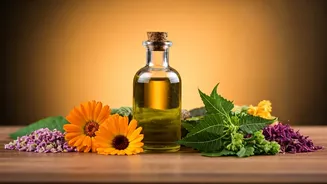Diwali and Ayurveda
Diwali, celebrated with great enthusiasm, often involves indulging in sweets and rich foods. Ayurveda, the ancient Indian system of medicine, offers a way
to balance these indulgences and maintain health during the festive season. The core idea is to align the celebrations with natural rhythms and individual body types (doshas). Ayurveda emphasizes practices like Abhyang Snan, dietary adjustments, and mindful living to promote overall well-being. By integrating these principles, Diwali can become a time of both celebration and self-care, enhancing the experience for all participants. The key is to find harmony between tradition and health, making the festival not only enjoyable but also beneficial for the body and mind. This approach ensures that the joyous occasion of Diwali contributes positively to one's physical and mental state.
Abhyang Snan Rituals
Abhyang Snan, a traditional ritual performed on Narak Chaturdashi, is a vital part of Diwali celebrations, particularly in Maharashtra. It involves an oil massage followed by a bath. The massage, typically done with warm sesame oil, is believed to pacify Vata dosha, known for its calming properties. This ritual not only cleanses the body but also nourishes the skin and promotes relaxation. The warm oil penetrates deep into the tissues, improving blood circulation and eliminating toxins. The subsequent bath, often with herbal ingredients, further cleanses and rejuvenates the body. The ritual is an important aspect of preparation for Diwali, signifying renewal and purification. It is believed to symbolize the victory of good over evil. Regularly doing Abhyang Snan, is an effective approach to reduce stress, improve sleep quality, and enhance overall vitality. It also has a positive effect on both physical and mental well-being.
Ayurvedic Diet Tips
During Diwali, incorporating Ayurvedic dietary principles can help balance the effects of festive feasting. Ayurveda advises mindful eating, paying attention to the quality and quantity of food consumed. It is recommended to choose lighter, easily digestible foods to avoid overburdening the digestive system. Including spices like ginger, cardamom, and cinnamon can aid digestion and boost metabolism. Staying hydrated is also very important, especially when consuming rich foods. You can consider incorporating herbal teas or warm water. Balance is the most important part of the diet. For example, include more fresh fruits and vegetables. Practicing moderation and making conscious food choices ensures that the festive season does not compromise your health. This approach will allow you to enjoy the delicious treats while supporting your body's natural functions. It is about making informed decisions to maintain a healthy and vibrant body.
Mindful Diwali Practices
Beyond diet and rituals, Ayurveda emphasizes the importance of mental well-being during Diwali. Practicing mindfulness can help reduce stress and enhance the overall festive experience. Meditation, deep breathing exercises, and spending time in nature can help calm the mind and promote relaxation. Lighting diyas and creating a peaceful ambiance can also contribute to a sense of tranquility. It's also important to manage expectations and avoid overcommitting to social events, allowing time for self-care. Participating in activities that bring joy, such as spending time with loved ones, can also boost mental health. By combining these practices, one can create a Diwali that nurtures not only the body but also the mind and spirit. Prioritizing mental well-being allows you to embrace the joy and positivity of the festive season in a balanced and fulfilling way. It is a harmonious approach that enhances the overall Diwali experience.
Herbal Remedies for Diwali
Ayurveda also offers herbal remedies to support health during Diwali. These remedies can help with various health issues that might arise during the festive season. For example, triphala, a blend of three fruits, can support digestion and detoxification. Ginger and tulsi (holy basil) can boost immunity and fight off infections. Drinking warm water with a pinch of turmeric can also help reduce inflammation and boost overall immunity. For skin problems, applying sandalwood paste can soothe and calm the skin, especially after the oil massage. It is important to consult an Ayurvedic practitioner or healthcare professional before taking any new herbal remedies, to ensure they are appropriate for your individual needs. Using herbal remedies in conjunction with dietary and lifestyle adjustments can greatly enhance the health benefits of your Diwali celebrations. These traditional remedies are a natural and effective way to promote well-being.















